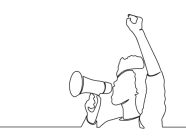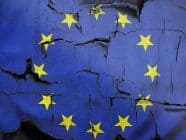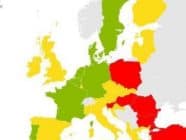The European Union’s proposal to strengthen national media self-regulatory bodies has triggered a new debate on whether or not regulatory institutions carry out their tasks effectively and efficiently. A Europe-wide research project “Media Accountability and Transparency in Europe” (MediaAcT) polled journalists from 14 countries to see how effective media regulation is, and how it should change. This report outlines some of the preliminary findings.
Neelie Kroes, Vice-President of the European Commission, caused a stir among journalists and media managers when she released her proposals on media regulation and measures to protect press freedom, in January this year. Her “High-Level Group on Media Freedom and Pluralism” focused on the consequences of high media-concentration in Eastern and Southern Europe. It also proposed strengthening national media self-regulation bodies, recommending that all European member states have an independent media or press council, which – in contrast to the current state of affairs in many European countries – should be able to impose strict sanctions.
![]() Several journalists and media associations interpreted the report as a sign that the EU wanted to restrict the freedom of the press. British journalists were especially sensitive to the debate, as the British government and media are currently battling over the shape of their own regulatory bodies. The British government ordered a review of the media after it emerged that some reporters from the News of the World had hacked into the voice mails of people in the news. Lord Justice Leveson, who carried out an extensive investigation into the matter, criticized the failure of Britain’s self regulatory body, the Press Complaints Commission to check tabloid excesses. pleaded for a system of “controlled self-control,” a system whereby the media self regulated within a legally agreed framework. His proposals have divided the British government and media.
Several journalists and media associations interpreted the report as a sign that the EU wanted to restrict the freedom of the press. British journalists were especially sensitive to the debate, as the British government and media are currently battling over the shape of their own regulatory bodies. The British government ordered a review of the media after it emerged that some reporters from the News of the World had hacked into the voice mails of people in the news. Lord Justice Leveson, who carried out an extensive investigation into the matter, criticized the failure of Britain’s self regulatory body, the Press Complaints Commission to check tabloid excesses. pleaded for a system of “controlled self-control,” a system whereby the media self regulated within a legally agreed framework. His proposals have divided the British government and media.
Old versus new models of media accountability
With the pressures of today’s highly competitive and increasingly digital market, are traditional models of media self-regulation, using professional codes of conduct and press councils, still relevant? Or do we need new forms of participative media accountability that involve both journalists and those who use the media? What role do traditional and new, often web based, tools of accountability play within the different media systems and journalism cultures in Europe?
A research team addressed these questions within the framework of the international research project “Media Accountability and Transparency in Europe” (MediaAcT) at the Erich Brost Institute for International Journalism at the Technical University of Dortmund. 1,762 journalists from twelve European (Germany, France, Italy, Finland, Austria, Switzerland, Poland, the Netherlands, Romania, the UK, Estonia and Spain) and two Arabic countries (Tunisia and Jordan) were surveyed in 2011 and 2012.
More piercing force for media accountability
According to the survey results, journalists know about the existence of laws, guidelines, and regulations, that can affect their work. In almost all of the 14 countries involved in the study, journalists said they consider media laws and the ethical guidelines set by their newsroom as having the biggest impact on their work. They also note that traditional instruments of media self-control such as press councils and professional codes of conduct, exert much less influence than the codes of their own newsrooms.
From an empirical point of view, it is understandable that the European Union questions whether the current potential of sanctions that European press councils have at their disposal are sufficient. And while press councils are often derided as ‘toothless tigers’, media professionals consider the alternatives to be even less acceptable.
The journalists who participated in the study believe ombudsmen and criticism of the media made in trade magazines, the mass media and external bodies such as NGOs and scientists, only have a marginal impact. They also believe that recently developed models of media observation, such as journalists’ blogs, or the citizens themselves, are not yet able to compete with the traditional instruments of regulation.
Younger journalists are more willing to consider alternative forms of regulation and accountability. Social media platforms are rated as the most important instrument of media accountability. The surveyed journalists state that they have received an increasing amount of feedback and criticism from their audience via Facebook and Twitter. The dialogue with their audience via social media is particularly important for the journalists in the two Arabic countries who are affected by their experience with governmental censorship.
It is the media companies’ responsibility
Looking at how the journalists’ points of view on media self-control and accountability differ in several countries, it becomes apparent that journalists in the Northern European countries which have a long history of self-control and professional structures appreciate press councils and press codes much more than their colleagues in the other countries. In Eastern and Southern European countries the professional culture of journalism is less developed, and professional consciousness is less distinctive. Professional codes of conduct have a much lower value in these countries where the journalists rely more on the guidelines used within their own newsroom.
The survey highlights the key role media companies have in the protection of professional and ethical standards – they play a bigger role in this context than the professional associations do. Journalists who work in newsrooms that support the debate on quality journalism attach greater importance to instruments of media self-control and seem to be more sensitive towards the topic of media accountability in general.
The MediaAcT study also shows that freelance journalists are noticeably disinterested in the topic of media self-regulation and media accountability. Journalists who are not deeply-seated in a newsroom seem to worry more about the marketability of their next story than about media responsibility. Besides, freelancers only rarely become the target of criticism from ombudsmen, media bloggers and others.
The dangerous effects of outsourcing
Media companies need to realize that they endanger their own success by continuing to outsource editorial tasks. In doing so they create a less engaged journalist class, which is less concerned with professional standards. The danger is that this downward pressure exacerbates the existing problems of the media’s credibility.
In Eastern and Southern Europe, journalists are even more skeptical about concept of media transparency. Many Spanish, Italian, Romanian and Polish journalists believe that publishing corrections or making newsroom processes transparent online will damage the bond of trust between journalists and the audience. More than anywhere else, the journalists from these four countries as well as from Jordan and Tunisia told the researchers that they worked for distinctly politically orientated media outlets, and therefore felt pressured by the government or that their work was constrained by a specific political idea.
In these countries, journalists and media users probably have different expectations of journalistic credibility and an efficient media self-regulation system. But are the Northern European “model” countries of media accountability immune to the influence of Southern and Eastern European models in the long-term?
Criticism by the audience is not appreciated
Only half of the respondents admit to taking audience criticism seriously. Journalists prefer to define what “good journalism” is on their own terms or among their colleagues. When asked to whom journalists feel responsible, 95 percent say their own conscience – they feel less constrained by “professional journalistic standards” or their “sources” and even less so by “the target audience” (82 percent) and the “public in general” (74 percent).
The study’s conclusion is that on the one side, journalism is still a profession affected first and foremost by individual ethics, and less by common professional standards, while on the other, many journalists are too ignorant of their most important stakeholders: their audience, even as the future of traditional media itself looks precarious.
In general, journalists claim that they are transparent and open in their work. The support calls for the disclosure of media ownership and say they want to be contactable by their audience online, but they dislike bodies and processes that question their traditional role as gate-keepers.
Criticism of colleagues is not common
In many countries there is hardly any culture of criticism from peers within newsrooms. Just a third of all the journalists surveyed admitted to criticizing their colleagues often or frequently. One of the rare exceptions is Finland, where newsrooms are less hierarchically organized, are journalists criticized more often by their peers.
External criticism by politicians, scientists or media users is also considered unwelcome and is often perceived as unfair by journalists. But howdoes this attitude sit in an era where influential institutions call for more media transparency? A model of journalism that fails to initiate a critical debate about its weaknesses and problems possibly misses the opportunity to highlight its strengths and its essential role within an efficient democracy in the digital age.
More incentives for self-regulation
This study should act as a wake-up call. On the one hand, almost 95 percent of the respondents agreed with the statement “media responsibility is an indispensable prerequisite for press freedom”, while on the other, the data shows that journalists exactly calculate what it “costs” them to follow the rules – or not.
If the media wants to avoid political repressions in the medium term, we can’t just pay lip service to the above-mentioned statement. Models of regulated self-regulation – where the government stimulates the media’s self-control by setting financial and legal incentives, but of course refrains from any sanctions – could be a solution. Our data clearly shows that journalists don’t want state intervention – the statement “formal systems of media regulation are open to political abuse” was widely supported by the almost 1,700 journalists who responded to our survey. But they perceive the existing instruments as insufficient as well – in sharp contrast to the industry representatives who, in reaction to the High-Level Group report, claimed that the existing systems of media self-regulation work properly and well. For example, while many UK industry representatives vocally opposed any form of co-regulation, journalists in the UK gave highest support to the statement “to be effective media self-regulation needs more sanctions.”
There is a wide divergence of opinion on how media self-regulation may become more effective but there are already some inspiring examples in Europe. Irish newsrooms receive legal benefits when they actively engage in media accountability. These examples could become trend-setters in a time when journalists from Finland to Romania regard economic pressure as the most serious threat to quality journalism.
Methodology
This report presents the results of the international research project “Media Accountability and Transparency in Europe” (MediaAcT) for the very first time. The project is based on a cooperation of partner institutions in Eastern and Western Europe and the Arab World. The Erich Brost Institute for International Journalism at the Technical University of Dortmund, Germany, has been responsible for the project’s coordination. The project is running for a period of three years and will end in July 2013. The study focuses on a culturally comparative analysis of traditional and innovative media accountability instruments (MAI), both online and offline. The empirical core of the study is a standardized online survey of 1,762 journalists across 14 countries. The survey which identified the attitudes of media professionals towards different media accountability instruments was conducted in 2011 and 2012. Further information is provided on the project’s website www.mediaact.eu .
A German version of this article was published in the German trade magazine “Message – Internationale Zeitschrift für Journalismus” No. 2 / 2013
Photo credits: MediaAcT
Tags: Accountability, Erich Brost Institute for International Journalism, Eu, European Union, Media Accountability, Media Accountability Systems, Media politics, Media Transparency, MediaAct, Neelie Kroes, transparency












































